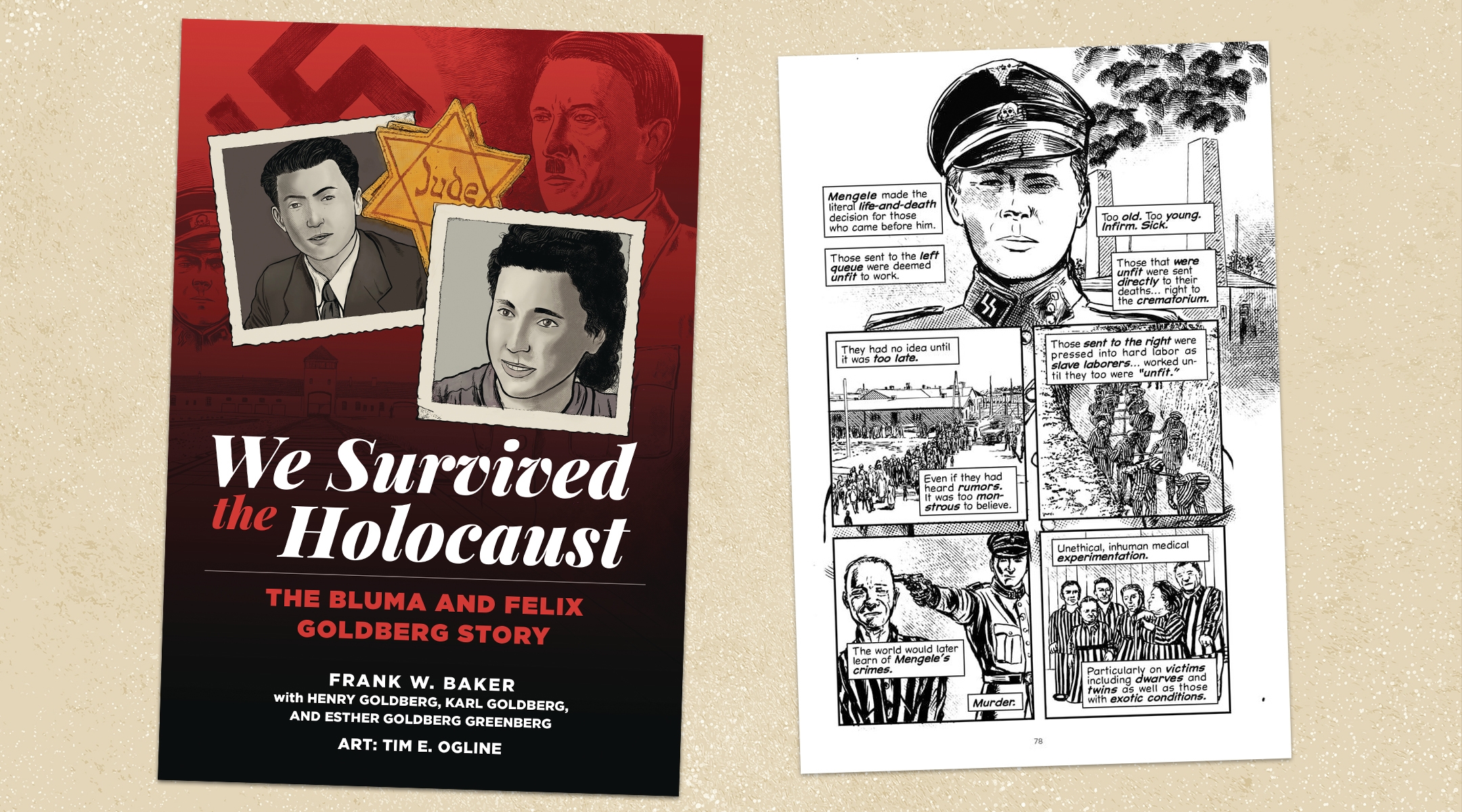South Carolina school district restricts Holocaust graphic novel for middle-graders, citing new state law
“We Survived the Holocaust” is a biography of local residents intended for young readers

Frank W. Baker’s book “We Survived the Holocaust,” featuring illustrations by Tim Ogline, tells the real-life story of Bluma Tishgarten and Felix Goldberg. (Courtesy Imagine and Wonder)
(JTA) — A school district in Columbia, South Carolina, will no longer use a graphic novel about local Holocaust survivors in its middle school curriculum, saying it violates new state guidelines governing which books are “appropriate” for the classroom.
A spokesperson for the Lexington One school district said that the book “We Survived the Holocaust,” written to educate young readers, will no longer be used in its fifth- and sixth-grade classrooms. The decision follows the passage this summer of restrictive new guidelines on instructional materials at the State Board of Education.
“This decision is based on a thorough evaluation of the suggested book, ‘We Survived the Holocaust,’ to determine its age appropriateness in accordance with State Board of Education Regulation (SBE) 43-170, which clarifies standards for the selection of instructional material,” district spokesperson Megan Moore told the Jewish Telegraphic Agency. Moore added that the book would still be available for eighth graders, and in its school library.
The decision is reminiscent of policies that have recently limited the reach of Jewish books across the country, including in South Carolina. Another district in the state briefly pulled “The Fixer,” the Bernard Malamud novel about antisemitism, from its shelves last year, restoring it after a panel review; districts in Florida, Texas and beyond have pulled various versions of Anne Frank’s diary, “Maus” and other books about the Holocaust and Jewish identity.
“I was and continue to be shocked, appalled and dismayed,” Frank Baker, author of “We Survived the Holocaust,” told JTA. He added that his book, published in 2022, had been used in fifth- and sixth-grade classrooms last year without incident before the new guidelines were passed. On his X social media account, Baker wrote, “Read the book they tried to ban.”
The book is a biography of local residents Bluma and Felix Goldberg, who as children were interned in Auschwitz, Bergen-Belsen and other concentration camps. They resettled in the Columbia, South Carolina area after the war with the aid of the Hebrew Immigrant Aid Society, now known as HIAS. After seeing Felix Goldberg deliver a lecture on Israel’s Holocaust Remembrance Day, Baker — who also created a resource guide for classrooms to teach media literacy — decided to tell the story in a book, with illustrations by Tim Ogline.
The book is intended for young readers and garnered praise, including from the Jewish Book Council, whose reviewer last year called it “thoroughly researched” and “appropriately based on the assumption that young readers need to understand the process of Nazi genocide.”
Baker promoted his book to local districts, alongside learning guides, in the hopes of educating local children about the Holocaust. The Lexington One district initially took him up on the offer to incorporate the book into its lesson plans.
But new rules on “age and developmentally appropriate” classroom material, which were supported by the conservative activist group Moms For Liberty, changed that equation.
The district also said that its evaluation of Baker’s book “included but was not limited to guidance from the South Carolina Council on the Holocaust,” without elaborating further. The council has a relationship with Baker, having hosted him for lectures the past two years.
In particular, Baker objected to the district’s contention that the images in his book were too graphic for middle-schoolers. The district declined to share its specific objections with JTA. But a social studies coordinator singled out one image in particular — of Nazi doctor Josef Mengele holding a gun to a Jewish prisoner’s head in Auschwitz — in an email to Baker.
“Honestly, these young people are exposed to more violent images in the media they attend to today,” Baker said. “And shielding students from a Nazi holding a gun to a Jew’s head — surely flies in the face of students today who have to undergo shooter drills.”












